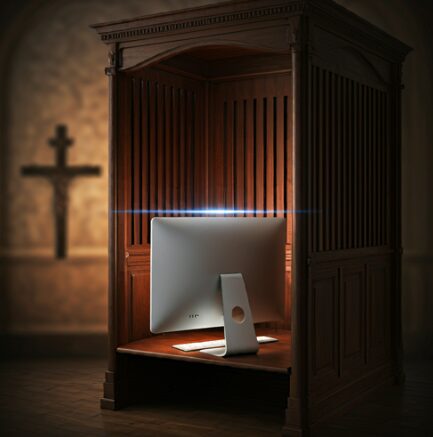Is This the Arrival of AI Christ?
Artificial intelligence is now stepping into the role of spiritual guide, with a Swiss church introducing an AI hologram of Jesus to hear confessions. A video showcasing this innovation at St. Peter’s Church in Lucerne has gone viral, sparking debates on faith, technology, and ethics.
One visitor described their experience with the AI Christ, dubbed the “Sermon-ator,” as surprisingly enlightening. “I asked about breaking the spiral of violence,” the individual said. “The response emphasized prayer and avoiding retribution, which deeply resonated with me.”
How AI Christ Functions
The confessional booth, known as Deus in Machina, features a screen displaying a lifelike image of Jesus. Before interacting, the AI issues a disclaimer: “Do not disclose personal information. Use at your own risk. Press the button to proceed.”
If users continue, the holographic Jesus interprets their questions and responds, its facial animation synchronized with its words. For example, when asked about the exclusion of women from priesthood, the AI referred to scripture, explaining that roles within the church align with God’s plan.
Theologians and computer scientists from Lucerne University of Applied Sciences and Arts developed the AI using data from the New Testament and other online religious resources. The program operates in 100 languages, making it accessible to worshippers globally.

Reactions to AI Christ
Reactions to this technological experiment have been mixed. Many attendees were moved by their interactions, with some describing it as deeply affirming. One person recounted, “The AI helped me consider how I could assist others in understanding Jesus better.” Another visitor posed a complex question about supporting a loved one considering assisted suicide. The AI’s response encouraged compassion, asking, “How can I support you in this difficult time?”
Others, however, criticized the initiative. Some dismissed the advice as overly generic, while others questioned the ethical implications of replacing human spiritual leaders with machines. Professor Peter Kirchschläger, a theologian from the University of Lucerne, argued that AI lacks the moral compass necessary for religious practice, a domain where human judgment remains essential.
A Catalyst for Discussion
St. Peter’s Church clarified that the project is experimental and temporary, with AI Christ available for confessions from August to October and participating in events until the end of November. The church’s theologian, Marco Schmid, emphasized that the goal is not to replace traditional religious practices but to explore the role AI might play in spiritual life.
“What we’re doing here is an experiment,” Schmid explained. “We want to use this as a starting point to discuss how AI could complement pastoral care, offering support at any hour.”
The emergence of AI Christ raises pressing questions: Is this a bold new way to integrate faith and technology? Or does it risk diluting the personal and sacred aspects of religion? Regardless of perspective, AI Christ has succeeded in sparking a meaningful conversation about spirituality in the digital age.

